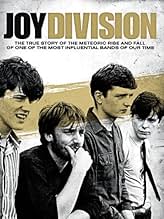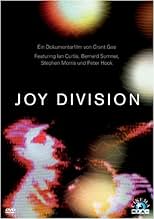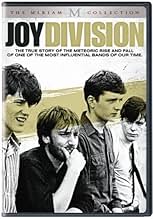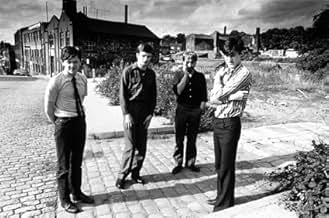Ajouter une intrigue dans votre langueA chronological account of the influential late 1970s English rock band.A chronological account of the influential late 1970s English rock band.A chronological account of the influential late 1970s English rock band.
- Réalisation
- Scénario
- Casting principal
- Récompenses
- 1 victoire au total
Genesis P-Orridge
- Self - Throbbing Gristle
- (as Genesis P. Orridge)
- …
Avis à la une
Grant Gee's inventive and honest documentary about Joy Division is not just a fine example of non-fiction film-making, but of film-making, full stop.
After the success of "Control", "Joy Division" has a new lease of interest behind it. It is, therefore, very good news to report that the film is not only interesting and informative, but also very effective. It is intelligent, though never ponderous. It is artistic, but never loses sight of its purpose.
The central interest of the film is not so much the eponymous band but the city of Manchester and the time and place which Joy Division found themselves in. Its focus here might tend to the ludicrous at points, but this is balanced by the human stories playing out in front of the northern backdrop.
There is very little complaint to be levelled at this film. It is not a masterpiece or extraordinary, but it is an excellent slice of cinema, knowledge and storytelling.
After the success of "Control", "Joy Division" has a new lease of interest behind it. It is, therefore, very good news to report that the film is not only interesting and informative, but also very effective. It is intelligent, though never ponderous. It is artistic, but never loses sight of its purpose.
The central interest of the film is not so much the eponymous band but the city of Manchester and the time and place which Joy Division found themselves in. Its focus here might tend to the ludicrous at points, but this is balanced by the human stories playing out in front of the northern backdrop.
There is very little complaint to be levelled at this film. It is not a masterpiece or extraordinary, but it is an excellent slice of cinema, knowledge and storytelling.
Post-punk band Joy Division were only around for a very short time but left a massive impression and would become one of the most influential bands of their time. They only recorded a couple of albums - 'Unknown Pleasures' and 'Closer' – but both would immediately be afforded classic status. In recent years there has been quite a lot of interest in them and the Manchester music scene that spawned them which has resulted in a couple of excellent films, 24 Hour Party People (2002) and Control (2007). The latter of which focused specifically on the late Ian Curtis, singer in the group. He was a famously troubled individual who was afflicted with severe epilepsy. His dark, highly personal lyrics went some way in characterising the Joy Division sound. Far from a typical rock character, he worked in the civil service helping the disabled find work. He killed himself in 1980 on the eve of Joy Division's first North American tour, he was 23. While this film is not all about Curtis and is more about the band in general, his presence in their story remains colossal and ingrained.
The story is significantly about the setting as well. Industrialised Manchester was a pretty bleak place back in the 70's and it's from this backdrop that the band emerges. There wasn't a great deal of hope for a lot of young people at this time and their frustrations were vocalised in the punk rock scene. An early Sex Pistols gig in the Manchester Free Trade Hall proving to be a massively influential event which encouraged the members of the future Joy Division that they could form a group and do a similar thing. By the time the band got going, the restrictive nature of pure punk rock had meant that in order to take its ethos forward a new music which retained its attitude but expanded its musical palette had to be devised. Joy Division were one of the key early innovators in what would go on to be known as post-punk. The documentary really focuses solely on Joy Division themselves and not this wider, very original music scene which ultimately led to alternative rock.
The film is based around the recollections of the three surviving members Bernard Summer, Stephen Morris and Peter Hook. It also has contributions from many others involved directly in the story such as Factory Records founder Tony Wilson, while it looks back on the significant work of others no longer with us like producer Martin Hannett. Curtis's lover Annik Honoré appears but his wife Deborah does not; there is still some understandable bad feeling from the latter about how she and her child were treated specifically in relation to Curtis's relationship with Honoré. Because of the lack of media outlets at the time and the very underground nature of the band there really is a paucity of visual material of them, aside from some bootleg footage and some television appearances, in addition there is a strange taped audio conversation of Curtis while under hypnosis. But the film-makers do make the film visually interesting enough for you not to really notice this very much, with much footage of Manchester at the time which almost feels like it is from another world now. There are also many experts who offer ideas about high concepts that they believed the band were aiming for with their music. While these sound good, they are a common trait of music journalism in general where everything is over-analysed. The truth comes out more from the mouths of the band themselves where we learn that Hook's distinctive high pitched bass style was devised purely because it was easier for him to hear over the top of the rest of the group during band practice and we also learn that the rest of the group really paid very little attention to the actual content of Curtis' lyrics at all. Like most great music it was created by chance chemistry between individuals and there wasn't much more to it than that. All-in-all, an informative documentary which illustrates how significant a band Joy Division was.
The story is significantly about the setting as well. Industrialised Manchester was a pretty bleak place back in the 70's and it's from this backdrop that the band emerges. There wasn't a great deal of hope for a lot of young people at this time and their frustrations were vocalised in the punk rock scene. An early Sex Pistols gig in the Manchester Free Trade Hall proving to be a massively influential event which encouraged the members of the future Joy Division that they could form a group and do a similar thing. By the time the band got going, the restrictive nature of pure punk rock had meant that in order to take its ethos forward a new music which retained its attitude but expanded its musical palette had to be devised. Joy Division were one of the key early innovators in what would go on to be known as post-punk. The documentary really focuses solely on Joy Division themselves and not this wider, very original music scene which ultimately led to alternative rock.
The film is based around the recollections of the three surviving members Bernard Summer, Stephen Morris and Peter Hook. It also has contributions from many others involved directly in the story such as Factory Records founder Tony Wilson, while it looks back on the significant work of others no longer with us like producer Martin Hannett. Curtis's lover Annik Honoré appears but his wife Deborah does not; there is still some understandable bad feeling from the latter about how she and her child were treated specifically in relation to Curtis's relationship with Honoré. Because of the lack of media outlets at the time and the very underground nature of the band there really is a paucity of visual material of them, aside from some bootleg footage and some television appearances, in addition there is a strange taped audio conversation of Curtis while under hypnosis. But the film-makers do make the film visually interesting enough for you not to really notice this very much, with much footage of Manchester at the time which almost feels like it is from another world now. There are also many experts who offer ideas about high concepts that they believed the band were aiming for with their music. While these sound good, they are a common trait of music journalism in general where everything is over-analysed. The truth comes out more from the mouths of the band themselves where we learn that Hook's distinctive high pitched bass style was devised purely because it was easier for him to hear over the top of the rest of the group during band practice and we also learn that the rest of the group really paid very little attention to the actual content of Curtis' lyrics at all. Like most great music it was created by chance chemistry between individuals and there wasn't much more to it than that. All-in-all, an informative documentary which illustrates how significant a band Joy Division was.
Obviously, this is filtered somewhat through the views of those who appear (and thus arguable how much is "true"), but in my view it's one of the best music documentaries I've ever seen, and very much reminded me why the band were so interesting at the time. I had a cassette with Unknown Pleasures on one side and Closer on the other, and played little else for a while - so well did it capture the mood of the times.
This film is very well put-together, making the best of the limited original source material, interspersed with well-lit interviews and extracts from Deborah's excellent book. Sad though to see how many others have died even since the making of this.
This film is very well put-together, making the best of the limited original source material, interspersed with well-lit interviews and extracts from Deborah's excellent book. Sad though to see how many others have died even since the making of this.
Joy Division, the mercurial Manchester based masters of dark post punk sounds, who in Ian Curtis had one of the eras most tortured souls.
Directed by Grant Gee and written by Jon Savage, this documentary actually brings nothing new to the table for hardened fans of the band, of which I am unashamedly amongst that number. There is a tendency with musical documentaries to be over praised by fans simply because, well, they just love to see their idols/heroes/inspirations up there on the screen. Grant Gee's film has strong merits as an introduction for those new to the band, for the curious and to those hypnotised by tunes so hauntingly poetic they can reduce you to tears, but again for those who have followed Joy Division and their subsequent brotherhood band, New Order, there is nothing to be learned here.
The absence of Deborah Curtis (Ian's widow) from the doc is annoying, where we are only given printed quotes from her. One can only guess that she refused to be sharing screen space with her love rival, and fellow tormentor of Ian Curtis' psyche, Annik Honoré, the latter of which who is more than happy to fuel the documentary fire. At times this feels like a copy of Anton Corbijn's superb film, Control, only with the real life band members and entourage commenting from the edges of the frame. But then there is of course the live excerpts of the band, which lifts this up to the high levels set by Control and Deborah Curtis' excellent book, Touching from a Distance.
In that, there is the crux, Joy Division the film is essential for fans, to see that performance of Shadowplay and etc etc, it's these moments that make us forgive the narrative, which quite frankly, is a bit of a cash cow cash in. And I really do say that with heavy heart. 8/10
Directed by Grant Gee and written by Jon Savage, this documentary actually brings nothing new to the table for hardened fans of the band, of which I am unashamedly amongst that number. There is a tendency with musical documentaries to be over praised by fans simply because, well, they just love to see their idols/heroes/inspirations up there on the screen. Grant Gee's film has strong merits as an introduction for those new to the band, for the curious and to those hypnotised by tunes so hauntingly poetic they can reduce you to tears, but again for those who have followed Joy Division and their subsequent brotherhood band, New Order, there is nothing to be learned here.
The absence of Deborah Curtis (Ian's widow) from the doc is annoying, where we are only given printed quotes from her. One can only guess that she refused to be sharing screen space with her love rival, and fellow tormentor of Ian Curtis' psyche, Annik Honoré, the latter of which who is more than happy to fuel the documentary fire. At times this feels like a copy of Anton Corbijn's superb film, Control, only with the real life band members and entourage commenting from the edges of the frame. But then there is of course the live excerpts of the band, which lifts this up to the high levels set by Control and Deborah Curtis' excellent book, Touching from a Distance.
In that, there is the crux, Joy Division the film is essential for fans, to see that performance of Shadowplay and etc etc, it's these moments that make us forgive the narrative, which quite frankly, is a bit of a cash cow cash in. And I really do say that with heavy heart. 8/10
A hauntingly beautiful account of the rise of the band Joy Division. As a half-interested fan, I expected not to be too impressed, but I was completely drawn in and mesmerised by the story. As others have noted, it makes a perfect companion piece to 'Control'. Definitely recommended for anyone who has ever heard and enjoyed a Joy Division song.
Le saviez-vous
- AnecdotesToutes les informations contiennent des spoilers
- ConnexionsReferenced in Film Junk Podcast: Episode 171: Bigger, Stronger, Faster* (2008)
- Bandes originalesDecades
Performed by Nau Ensemble
Licensed courtesy of Warner Music Sweden
Written by Ian Curtis (as Curtis) / Hans Ek (as Ek)
Published by Fractured Music and Jazz Beat Music Entertainment
Meilleurs choix
Connectez-vous pour évaluer et suivre la liste de favoris afin de recevoir des recommandations personnalisées
- How long is Joy Division?Alimenté par Alexa
Détails
- Durée
- 1h 33min(93 min)
- Couleur
- Mixage
- Rapport de forme
- 1.78 : 1
Contribuer à cette page
Suggérer une modification ou ajouter du contenu manquant























